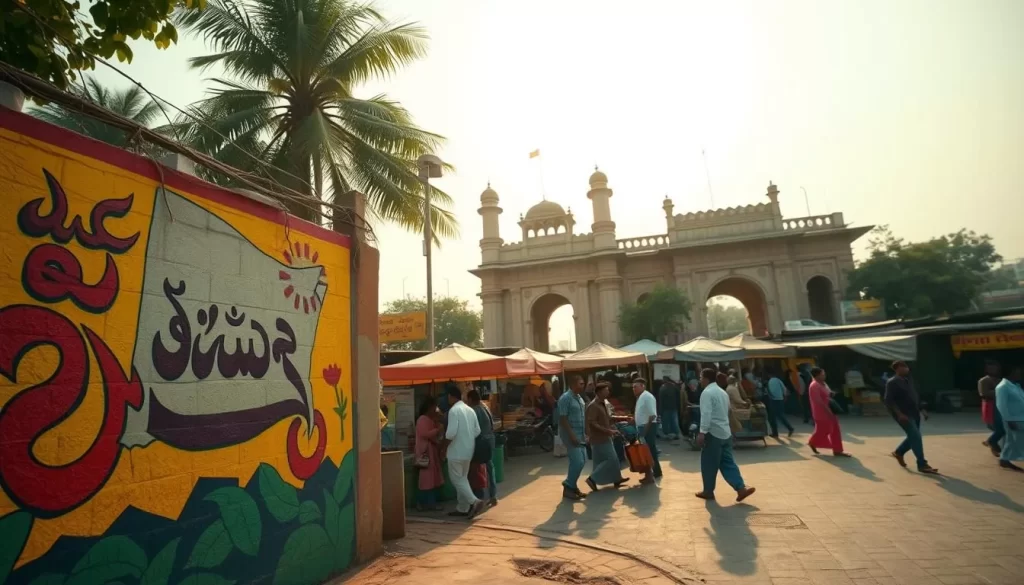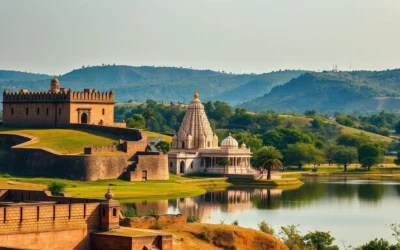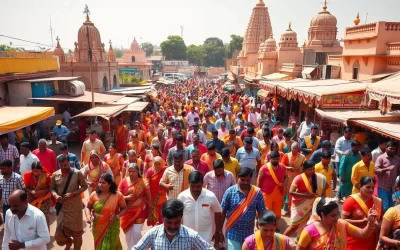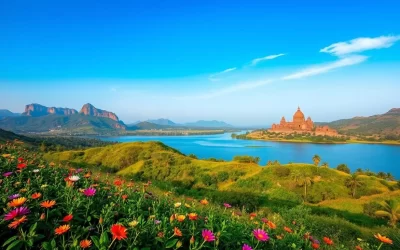✓ Accommodations✓ Flights✓ Rental Cars
As you explore the vibrant state of Telangana, you’ll discover a rich tapestry of cultures and languages that define its identity.
Understanding the official languages and those widely spoken in Telangana is crucial for effective communication and deeper cultural immersion.
You will find that the linguistic landscape is diverse, with various dialects and languages being an integral part of daily life. This diversity is a hallmark of the region’s heritage.
The Linguistic Landscape of Telangana
As you explore Telangana, you’ll discover a vibrant tapestry of languages spoken across the state. This diversity is a reflection of the state’s rich cultural heritage and complex history.
A Brief Introduction to Telangana State
Telangana is a state in southern India, known for its distinct cultural identity. Formed in 2014, it has a unique blend of traditional and modern influences. The state’s history is reflected in its linguistic diversity.
Language Demographics in Telangana
The language demographics in Telangana are characterized by a predominant use of Telugu, followed by Urdu and other regional languages. According to the census data, Telugu is the most widely spoken language, while Urdu also has a significant presence. The linguistic diversity is a testament to the state’s cultural richness.
Telugu: The Official Language of Telangana
In Telangana, Telugu is not just a language; it’s a symbol of the state’s rich cultural heritage. As you explore the depths of Telangana’s identity, you find that Telugu is intricately woven into the fabric of its society.

History and Origin of Telugu
Telugu has a storied past, with its origins tracing back to the ancient Sanskrit language. It evolved over centuries, influenced by various regional dialects and cultures. Some key aspects of Telugu’s history include:
- The earliest known Telugu inscriptions date back to the 6th century.
- Telugu literature flourished during the Kakatiya dynasty in the 12th century.
- The language continued to evolve, incorporating elements from other languages.
Cultural Significance of Telugu in Telangana
Telugu is deeply ingrained in the cultural practices of Telangana. It is the language of daily communication, literature, and cultural events. You can experience the richness of Telugu in:
- Festivals like Bathukamma, where Telugu folk songs play a significant role.
- The vibrant Telugu cinema, known as Tollywood, which influences popular culture.
Telangana, India: Official and Widely Spoken Languages
As you explore the linguistic landscape of Telangana, India, you’ll discover a rich tapestry of languages. The state’s linguistic diversity is a reflection of its cultural heritage.
Telugu as the Primary Language
Telugu is the official language of Telangana and is widely spoken by the majority of the population. It is a significant part of the state’s cultural identity, with a rich literary and cultural heritage. You can experience the beauty of Telugu literature and poetry in various forms of art and media.
Other Official Languages in the Region
In addition to Telugu, other languages are also recognized in the region. For instance, Urdu is another official language, reflecting the state’s historical and cultural ties. You can see the linguistic diversity in the table below:

| Language | Significance | Usage |
|---|---|---|
| Telugu | Official language, cultural significance | Widely spoken, official purposes |
| Urdu | Official language, historical significance | Used in official contexts, cultural events |
| Other languages | Regional dialects, minority languages | Used in local communities, cultural events |
Urdu and Its Influence in Telangana
As you explore the linguistic landscape of Telangana, you’ll discover the significant role Urdu plays in the region. The presence of Urdu is deeply rooted in the state’s history and culture.
Historical Context of Urdu in Telangana
Urdu has a rich historical context in Telangana, dating back to the rule of the Qutb Shahi dynasty and later the Nizams. During this period, Urdu emerged as a prominent language, influencing the local culture and literature.
Current Status and Usage of Urdu
Today, Urdu continues to be an important part of Telangana’s linguistic identity. It is widely used in official contexts, education, and cultural events. Many people in Telangana are proficient in Urdu, and it remains a vital part of the state’s cultural heritage.  The government also supports the promotion of Urdu through various initiatives, ensuring its continued relevance in modern times.
The government also supports the promotion of Urdu through various initiatives, ensuring its continued relevance in modern times.
Other Languages Spoken in Telangana
In Telangana, you can hear a multitude of languages being spoken, reflecting the state’s rich cultural heritage. This diversity is a testament to the state’s history and its position within India.

Hindi Usage in Telangana
Hindi is widely understood and spoken in Telangana, particularly in formal and educational contexts. As a result, many residents are proficient in Hindi, using it for official purposes or when interacting with people from other parts of India.
English as a Link Language
English serves as a crucial link language in Telangana, especially in professional, educational, and governmental spheres. Its usage facilitates communication with the global community and is often used in higher education and business.
Regional Dialects and Minority Languages
Telangana is also home to various regional dialects and minority languages, which add to its linguistic diversity. Languages such as Marathi and Kannada are spoken by smaller communities, reflecting the state’s multicultural identity.
Language Diversity and Cultural Heritage
Telangana’s rich cultural heritage is deeply intertwined with its linguistic diversity. The state’s history and cultural evolution have been shaped by various languages, contributing to its unique identity.
How Language Shapes Telangana’s Identity
Language plays a crucial role in defining the cultural identity of Telangana. The Telugu language, being the official language, significantly influences the state’s traditions, literature, and daily life. It acts as a unifying factor among the people.
Festivals and Traditions Associated with Languages
Telangana’s festivals and traditions are closely linked to its linguistic heritage. For instance, the Bathukamma festival, celebrated with great fervor, showcases the state’s cultural richness through traditional songs and dances in Telugu. Such events highlight the importance of language in preserving cultural heritage.
Conclusion
In summary, the official and widely spoken languages of Telangana contribute significantly to its cultural richness. The state’s linguistic diversity, with Telugu and Urdu playing key roles, reflects its complex history and cultural depth. As you’ve seen, language is integral to Telangana’s identity, influencing its traditions and daily life. This diversity is a strength, making Telangana a unique and fascinating region. Understanding its languages provides insight into the state’s heritage and its people’s way of life.
The above is subject to change.
Check back often to TRAVEL.COM for the latest travel tips and deals.






